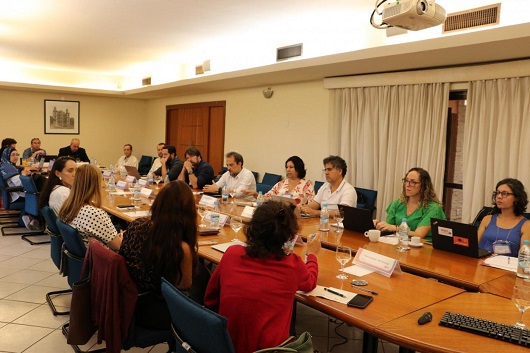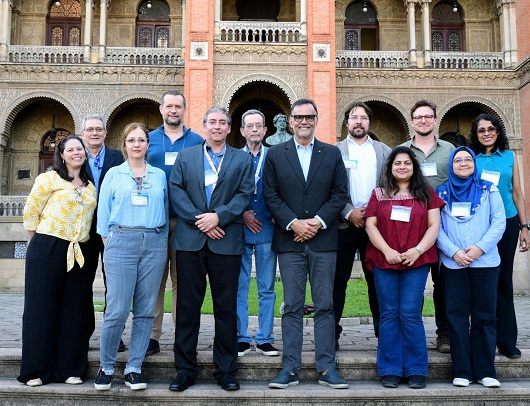Dengue Alliance's Steering Committee meets at Fiocruz
18/11/2023
Ana Paula Blower (Fiocruz News Agency)
The Joint Steering Committee of the Dengue Alliance met last week at Fiocruz to exchange experiences and align important points to advance toward the goal of having a new treatment accessible from already approved drugs - and their combinations - for dengue within five years. At the meeting, which took place between November 8 and 10, it was possible to make progress in the debate on the selection of a drug candidate for clinical trials and the treatment, the diagnostic strategy and biomarkers, and the design of the clinical trial due to start in 2024, in Brazil.
The meeting had the goal of advancing in a new treatment accessible from already approved drugs (photo: Peter Illiciev)
The Dengue Alliance is a global partnership led by institutions from countries endemic to the disease; Fiocruz is part of the group, in which the Federal University of Minas Gerais (UFMG) also participates representing Brazil, in a joint effort to control dengue. The meeting held at Fiocruz was attended by representatives from Malaysia, Brazil, India, Switzerland and Thailand.
The alliance works on joint projects to advance pre-clinical research into possible treatments, test the efficacy of treatment candidates and implement clinical trials out of those most promising. The partners share knowledge, technologies and capabilities in a pre-clinical working group, which analyzes the selection of the drug candidate, a clinical one, which defines what the clinical trial will look like, and a translational one, for effective communication and scientific planning.
Last Wednesday (11/8), the steering committee visited the Institute of Drug Technology (Farmanguinhos/Fiocruz), the Immunobiological Technology Institute (Bio-Manguinhos/Fiocruz), and was received at the Moorish Castle by the president of Fiocruz, Mario Moreira, who stressed that tackling dengue is a priority at Fiocruz. He recalls that the Brazilian Ministry of Health created the Program for Neglected Populations and Diseases, such as dengue, which involves different agencies and civil society to organize the fight against these diseases. "Fiocruz plays a central role in the coping strategy as we have reference laboratories, a large postgraduate program focused on this type of disease, and because we are deeply involved in the production of diagnostics, serological and molecular tests and vaccines."
Promising progresses
During the meeting, the group was received at the Official Residence by the vice president for Production and Innovation (VPPIS/Fiocruz), Marco Krieger. For him, the alliance meetings are essential for updating and standardizing the progress of the projects. "It is important that we coordinate the groups so that the work is complementary and adds value to each other", he said. He also highlighted as positive the results presented by the pre-clinical working group in identifying a candidate drug, as well as the assessment of diagnostic tools. "We already have a set of data that allows us to assess that we are on a great path. It is an ambitious project, which envisages that in five years we will be able to come up with a treatment for a disease that we have been facing in the country for the last fifty years".
The Dengue Alliance representatives were received at the Moorish Castle by Fiocruz president, Mario Moreira (photo: Peter Ilicciev)
This was the group's tenth meeting and the second in person - the first was in February this year, in India. For the Latin American director of the Drugs for Neglected Diseases initiative (DNDi), Sergio Sosa-Estani, the meetings are key for strengthening the South-South alliance and cooperation in the fight against dengue. He explains that there were discussions on the aspects of the incorporation of new lines of biomarkers for the response of patients' clinical improvement, diagnosis and the next steps for the clinical trial, which will have Brazil as the first country in Latin America. "There has been technical-scientific work that allows us to be close to defining the candidate to be assessed in the clinical stage; we have also made progress about the design of the clinical trial, how we are going to measure efficacy and how we are going to assess the results with the strategies that we are considering for the search for new therapeutic forms for the treatment of dengue", explained Sosa-Estani.
He emphasizes that dengue treatment would be in addition to other strategies already implemented, such as the vector control carried out by The Wolbachia Project and the recently implemented vaccines. "Drug treatment would be a complete way of having tools to control the disease", he concluded.
During the meeting, Fiocruz presented its actions to control the disease in the country, such as diagnostic tools and the Wolbachia project. It also chaired panels, as well as a discussion on access gaps in Brazil.
Dengue Alliance
Launched in 2022, the Dengue Alliance has as partners DNDi, the Faculty of Medicine Siriraj Hospital at Mahidol University in Thailand; the Malaysian Ministry of Health; Fiocruz and UFMG in Brazil; and the Translational Health Science and Technology Institute (THSTI) in India. The Drugs for Neglected Diseases Initiative (DNDi) coordinates the Alliance.


